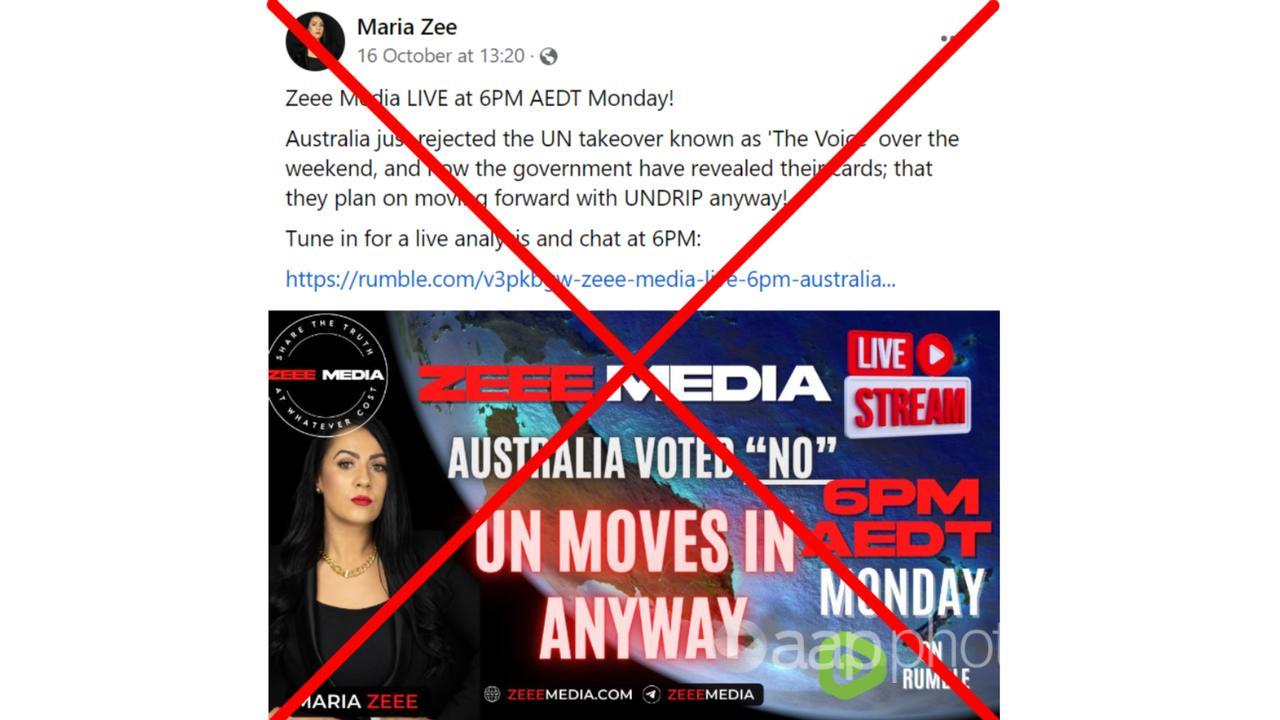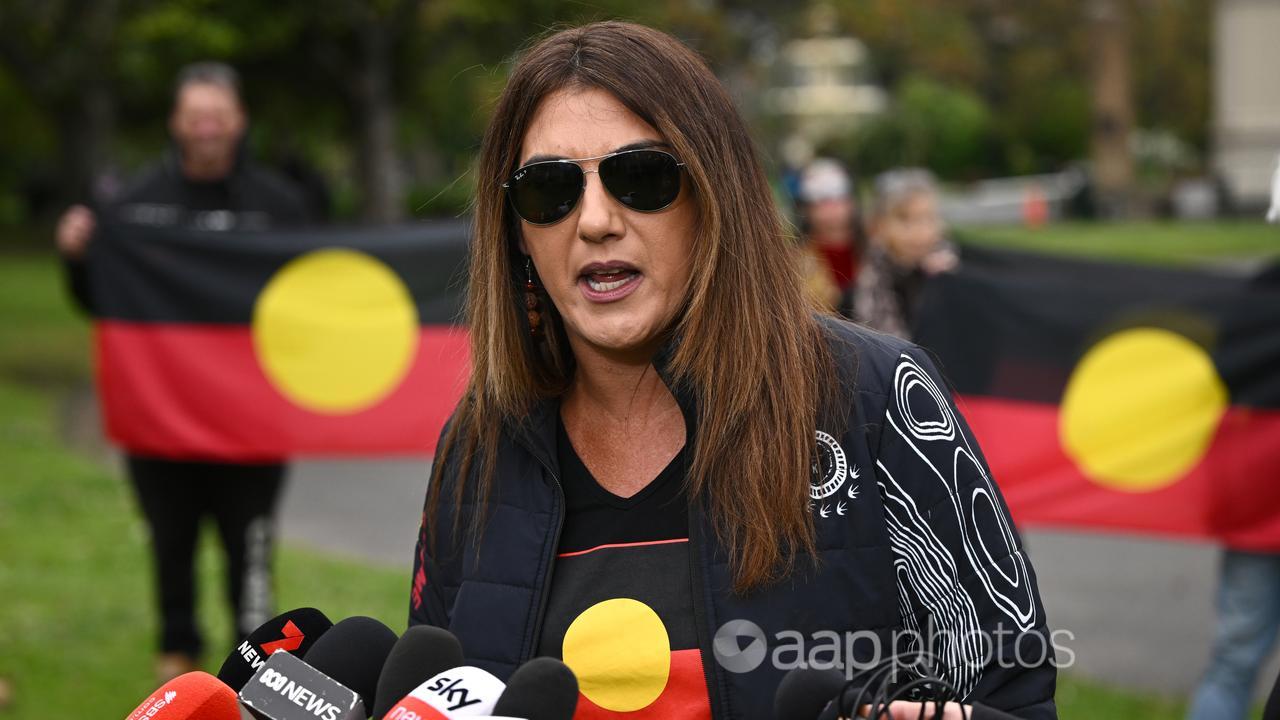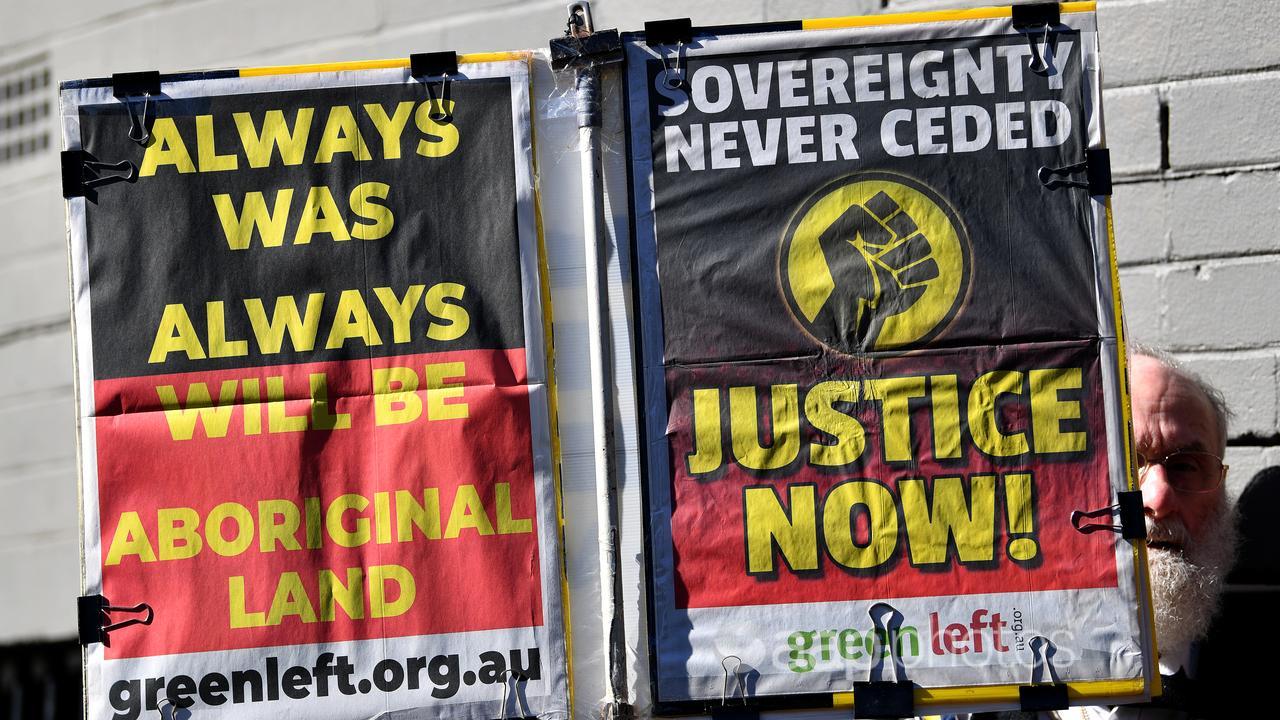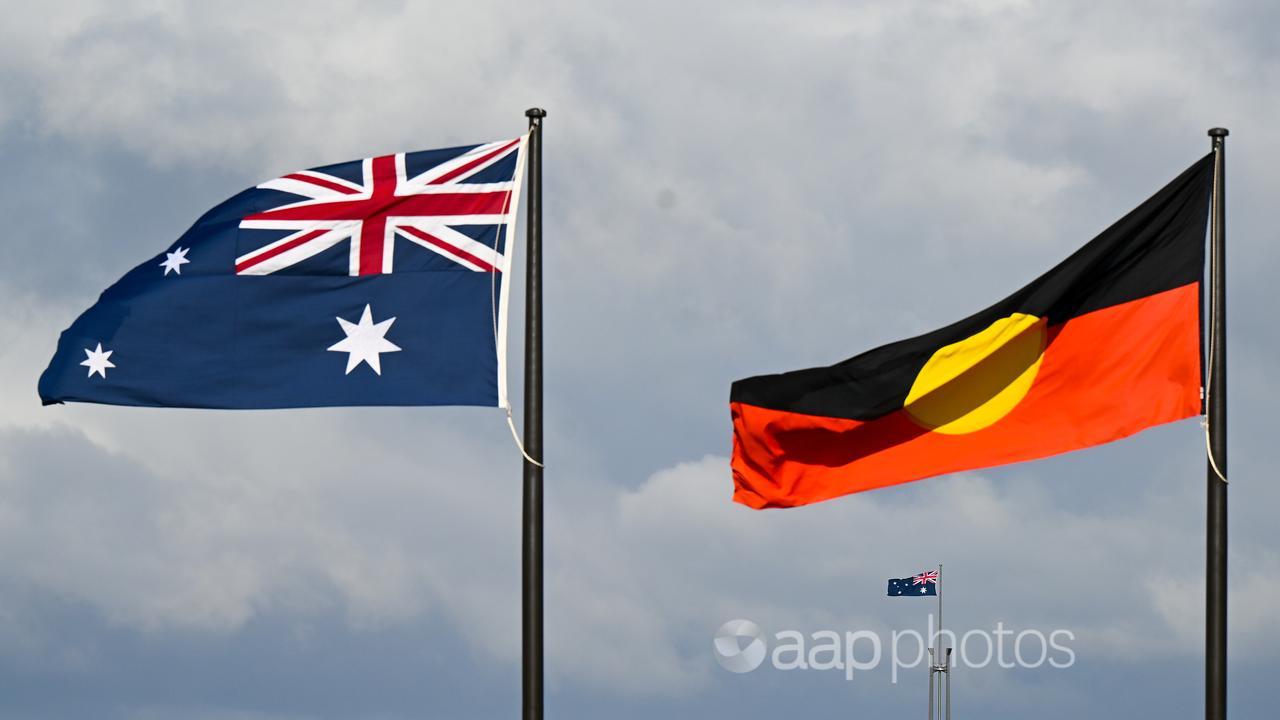With the Indigenous voice defeated, the United Nations (UN) is now being accused of a fresh power grab in Australia.
The UN was the subject of numerous false claims during the referendum campaign, examples here, here and here.
Social media users are now claiming that if Australia implements the UN’s Declaration on the Rights of Indigenous Peoples (UNDRIP), the country will be formally signed over to the global organisation.
The claim is false. Experts told AAP FactCheck that UNDRIP actually protects the “territorial integrity” of all states.
The claim emerged after independent senator Lidia Thorpe announced on referendum night that she planned to push for the declaration’s adoption.

Maria Zeee, a frequent spreader of misinformation in Australia, told her followers in a video this would formally sign over Australia to the UN.
Her video is being shared across Facebook, examples here, here and here.
The text of each post follows a similar theme: “Australia voted ‘no’ but they have plans to push UNDRIP through, regardless.”
In the video, Ms Zeee cites Article 46 of the declaration as being of considerable concern.
She says: “Nothing in this Declaration may be interpreted as implying for any State, people, group or person any right to engage in any activity or to perform any act contrary to the Charter of the United Nations …,” (video mark 24min 44sec).
She then comments: “Meaning, you are subjected to us. That is what this document is. So a formal implementation of UNDRIP would be a formal signing over Australia to the United Nations.”
However, she failed to include the rest of Article 46: ” … or construed as authorizing or encouraging any action which would dismember or impair, totally or in part, the territorial integrity or political unity of sovereign and independent States.”
Ken Coates, an expert on Indigenous legal rights and the implementation of UNDRIP in Canada, told AAP FactCheck the claim was “bizarre misinformation”.
He said Article 46 defended nations by stating “nothing in the declaration should dismember or impair the territorial integrity or political unity of sovereign states”.
Dr Coates said the start of Article 46 referred to the UN Charter, which recognises the integrity of the states.
He said Canada had not been handed over to the UN after legislating UNDRIP.
“Absolutely and categorically not. Where do these ideas come from?” Dr Coates said.

Irene Watson, a law professor with a focus on Indigenous peoples, told AAP FactCheck the claim was “both a dumb and false proposition”.
“Article 46 is very clear … its focus is all about the ‘territorial integrity of the state’,” Professor Watson said.
“There is nothing in the UNDRIP which would unsettle the colonial state of Australia.
“If anything, it re-articulates the dominant position of the universal state.”
Australia was one of four states to initially vote against UNDRIP in 2007, along with Canada, New Zealand and the US.
Robert Hill, Australia’s ambassador to the UN at the time, told the General Assembly Australia was dissatisfied with references to self-determination. The UN released a statement explaining Australia’s opposition.
But in March 2009, the Labor government announced it would support UNDRIP.
This was formalised in a statement to parliament by then Indigenous affairs minister Jenny Macklin in April 2009. She stated the declaration was aspirational, non-binding and didn’t affect existing Australian law.
This remains the current status of UNDRIP in Australia. It has been endorsed but not implemented into Australian law.

Senator Thorpe, a prominent campaigner against the voice, announced on referendum night she planned to push for the declaration’s adoption.
A submission from the Law Council of Australia to a Senate inquiry into UNDRIP, which began in March 2022, recommended the development of a national action plan.
It said UNDRIP’s implementation could range from reviewing legislation to ensure consistency with UNDRIP, to implementing UNDRIP in a federal Human Rights Act or in standalone legislation (page 5).
In July 2022, the Law Council called on governments to comprehensively adopt UNDRIP to protect the human rights of First Nations peoples.
The council’s recommendation echoes steps taken in Canada to implement UNDRIP in legislation.
In June 2023, the Canadian government unveiled an action plan for implementing UNDRIP, two years after enacting an UNDRIP Act.

Dr Coates told AAP FactCheck UNDRIP had made little difference for Canada’s Indigenous people.
“Canada’s parliament passed an act that is essentially a promise to make more promises,” Dr Coates said.
“Indigenous peoples have had too many broken promises in the past.”
Prof Watson predicted UNDRIP would likewise have little impact for Indigenous people in Australia.
“UNDRIP, as we have seen in Canada with CANDRIP, it is not only tokenistic, it is also unsettling of Aboriginal sovereignty, that is, an implied reading that the nations are in general under the sovereignty of the state,” Prof Watson said.
“State sovereignty will prevail over First Nations.
“Article 46 is an affirmation of state sovereignty and supremacy over all colonised peoples.”
The Verdict
The claim Australia will be signed over to the United Nations if it implements the Declaration on the Rights of Indigenous Peoples is false.
Experts told AAP FactCheck that Article 46 of UNDRIP states the opposite, that the declaration can’t impair the “territorial integrity or political unity” of sovereign states.
False — The claim is inaccurate.
AAP FactCheck is an accredited member of the International Fact-Checking Network. To keep up with our latest fact checks, follow us on Facebook, Twitter and Instagram.
All information, text and images included on the AAP Websites is for personal use only and may not be re-written, copied, re-sold or re-distributed, framed, linked, shared onto social media or otherwise used whether for compensation of any kind or not, unless you have the prior written permission of AAP. For more information, please refer to our standard terms and conditions.


















